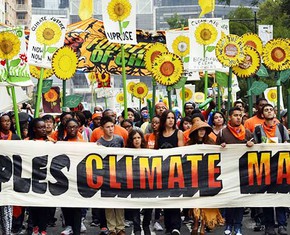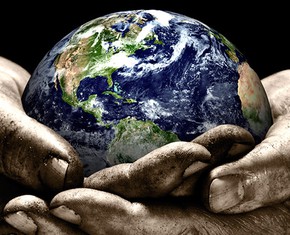The views expressed in our content reflect individual perspectives and do not represent the authoritative views of the Baha'i Faith.
All around us, we see evidence of social disintegration—wars, famine, climate change. But look deeper, and you’ll see forces of integration at work in society, too.
In fact, the forces of disintegration allow the countervailing forces of integration to operate and become stronger. All organic systems function this way—they simultaneously host growth and decay, that ongoing process of building up and tearing down. When a tree dies and falls in a forest, new ones sprout and grow. The death of one organism assures the life of its successor.
The Baha’i writings define those opposing forces of integration and disintegration this way:
… the convulsions of this transitional and most turbulent period in the annals of humanity are the essential prerequisites, and herald the inevitable approach, of that Age of Ages, “the time of the end,” in which the folly and tumult of strife that has, since the dawn of history, blackened the annals of mankind, will have been finally transmuted into the wisdom and the tranquility of an undisturbed, a universal, and lasting peace, in which the discord and separation of the children of men will have given way to the worldwide reconciliation, and the complete unification of the divers elements that constitute human society. – Shoghi Effendi, The Promised Day is Come, p. 124.
Such simultaneous processes of rise and of fall, of integration and of disintegration, of order and chaos, with their continuous and reciprocal reactions on each other, are but aspects of a greater Plan, one and indivisible, whose Source is God, whose author is Baha’u’llah, the theater of whose operations is the entire planet, and whose ultimate objectives are the unity of the human race and the peace of all mankind. – Shoghi Effendi, The Advent of Divine Justice, pp. 72-73.
When you look for the forces of integration, even though they may not seem obvious at first, it helps to know that they generally rely on individuals coming together to find spiritual solutions to common problems.
When we look at the mass migrations now taking place around the world, for example, some see chaos and trouble. More than a quarter billion people have left their home countries in search of a viable future elsewhere. Those migrants have no choice but to flee war, violence, hunger and persecution, or economic deprivation and environmental degradation.
When mass migrations occur, usually a neighboring nation, or an altruistic one, decides how many immigrants it will accept. To address this growing movement of populations, world leaders gathered in December of 2018 at a historic Morocco conference where 164 nations adopted the first-ever United Nations global agreement on a common approach to international migration. The Baha’i International Community, a non-governmental organization at the UN, issued this statement:
The movement of populations has, over the centuries, allowed civilisations to come into contact with insights and advances made elsewhere, and enabled entire societies to emerge. Today, it is one of the means by which the bonds between peoples of diverse backgrounds are continuously strengthened and is a key catalyst in the emergence of a world community. In its current form, however, the movement of populations, often prompted solely by the desperate need of individuals to seek a viable future elsewhere, is shedding light on the urgent necessity to revisit the way in which humanity is organised. …
Such a long-term approach calls for a far-reaching, multi-dimensional, dispassionate and informed conversation around the issue of migration. That conversation cannot fall short of examining social, political and economic structures, systems and attitudes that underpin and perpetuate the current order. It needs to include a genuine reflection on how this order can be redesigned to ensure an adequate response to the needs of masses of the world’s population living in situations of war, poverty and oppression. Most importantly, it needs to be based on the understanding of the indisputable interconnectedness of our societies, and the reality that humanity’s collective life suffers when any one group thinks of its own well-being in isolation from that of its neighbors. – BIC, Viewing the movement of populations in the larger context of humanity’s collective life
In another sign of societal integration, the United Nations has made the reduction of extreme poverty the first of its Millennium Development goals. The Baha’i teachings offer much encouragement and promise towards this end:
Among the results of the manifestation of spiritual forces will be that the human world will adapt itself to a new social form, the justice of God will become manifest throughout human affairs, and human equality will be universally established. The poor will receive a great bestowal, and the rich attain eternal happiness. For although at the present time the rich enjoy the greatest luxury and comfort, they are nevertheless deprived of eternal happiness; for eternal happiness is contingent upon giving, and the poor are everywhere in the state of abject need. Through the manifestation of God’s great equity the poor of the world will be rewarded and assisted fully, and there will be a readjustment in the economic conditions of mankind so that in the future there will not be the abnormally rich nor the abject poor. The rich will enjoy the privilege of this new economic condition as well as the poor, for owing to certain provisions and restrictions they will not be able to accumulate so much as to be burdened by its management, while the poor will be relieved from the stress of want and misery. – Abdu’l-Baha, The Promulgation of Universal Peace, p. 132.
The hard work of many individuals and organizations in social and economic development has succeeded in reducing extreme poverty around the world by more than half since 1990—and the goal of ending extreme poverty by 2030 is not too far away. This year, more than a thousand people gathered at the 9th Global Social Business Summit to spread awareness about social business, foster discussion and collaboration between practitioners and stakeholders, and conceive best practices. Experts came from the private sector, civil society, governments and academia over a few days of meetings, forums and workshops in order to solve global poverty.
Gender equality is the fifth Millennium Development goal—and a fundamental principle of the Baha’i Faith, as well. In a talk in Montreal in 1912, Abdu’l-Baha said:
… there must be an equality of rights between men and women. Women shall receive an equal privilege of education. This will enable them to qualify and progress in all degrees of occupation and accomplishment. For the world of humanity possesses two wings: man and woman. If one wing remains incapable and defective, it will restrict the power of the other, and full flight will be impossible. Therefore, the completeness and perfection of the human world are dependent upon the equal development of these two wings. – The Promulgation of Universal Peace, p. 318.
Since then women have made important inroads into civil, societal and political leadership across the world—but their representation in national parliaments at 23.7% is still far from parity. In the U.S., one in five members of the 116th Congress are women. In 1912, however, no women served in Congress.
Numerous organizations and individuals now work to end discrimination against women and girls. In 2018, 1,250 leaders from 65 countries came together at the 2018 Global Summit of Women to develop strategies to engage more women and create a better world.
We do not need to look very hard to see these forces of integration—as the Baha’i writings teach us, these forces operate all around us—and within us. Let’s all resolve to collectively use these forces for the betterment of humanity.
















Comments
Sign in or create an account
Continue with Googleor